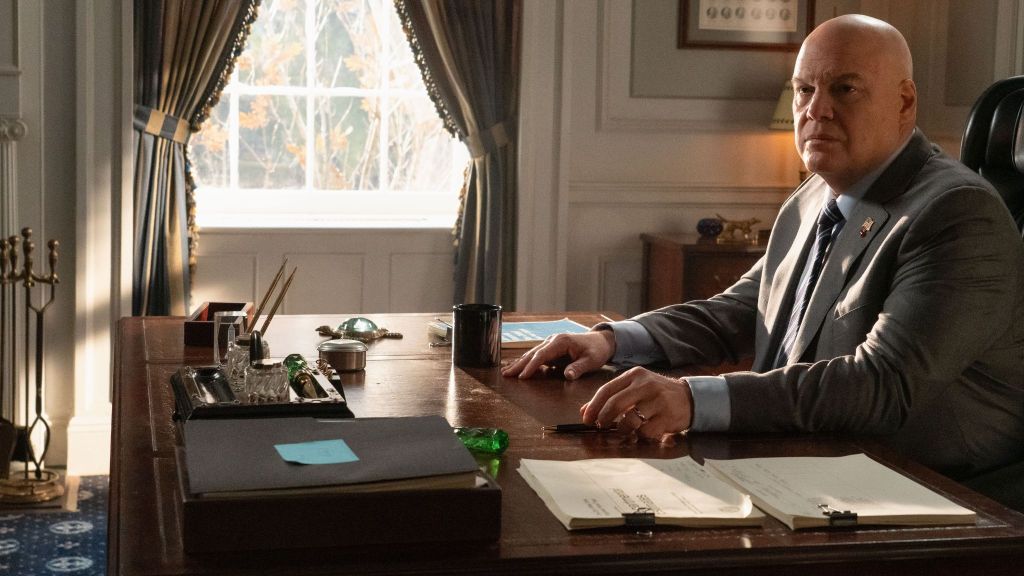Daredevil: Born Again explores the transformation of Wilson Fisk (Vincent D’Onofrio) from exiled crime lord to New York City’s mayor, executing a carefully orchestrated political game while maintaining his underlying ruthlessness. Standing in Fisk’s shadow, young campaign assistant Daniel Blake (Michael Gandolfini) has proven himself a devoted acolyte, eagerly learning the Kingpin’s methods of power and persuasion. From the earliest episodes, Daniel’s enthusiastic support for Fisk stands out as both genuine and slightly concerning, as his admiration for Fisk’s efficiency and decisiveness reveals a dangerous attraction to authoritarian approaches. As the season progresses, Daniel’s unwavering loyalty and willingness to cross ethical lines for Fisk become more troublesome. By Episode 7, Daniel Blake crosses a line from which there may be no return.
Videos by ComicBook.com
WARNING: Spoilers below for Daredevil: Born Again Season 1, Episode 7
Daniel’s journey in Daredevil: Born Again began as Fisk’s campaign assistant, where his youthful energy and genuine belief in Fisk’s vision made him valuable to the mayoral campaign. In early episodes, he handled social media engagement and ground-level outreach, effectively translating Fisk’s message to younger demographics that might otherwise be suspicious of the controversial candidate. His first substantial interaction with Fisk established their dynamic when Daniel explained his unquestioning belief in Fisk’s methods and his desire to emulate them.
Daniel’s relationship with journalist BB Urich (Genneya Walton) initially developed as part of his media outreach duties, with Daniel serving as a conduit between the mayoral campaign and the press. Their early interactions were marked by Daniel’s enthusiasm occasionally outpacing his discretion, culminating in a pivotal moment during a night of drinking at a club. There, Daniel inadvertently leaked sensitive information about Fisk’s plans regarding union contracts and the port project redevelopment. BB leveraged this slip-up for her exposé titled “Mayor Garbage,” which painted Fisk as a union-buster and created substantial political headaches for the administration. This incident marked the first major test of Daniel’s position within Fisk’s organization.

[RELATED: All 7 MCU Daredevil Appearances Ranked (Including Born Again)]
What distinguished Daniel from Fisk’s many disposable subordinates was his response to this failure. Rather than deflecting blame or attempting to flee Fisk’s wrath, Daniel directly admitted his mistake. He pledged continued loyalty even while acknowledging he’d likely be removed from his position. This display of accountability, rare in Fisk’s world of self-serving associates, caught the mayor’s attention. Instead of the severe punishment that might have been expected, Fisk delivered a chilling but ultimately merciful response: “In the fullness of time, you’ll make a better man. That said, if you ever do anything like that again, it’ll be the last thing you ever do.” This moment cemented the beginning of a mentorship.
Daniel received increasingly significant responsibilities, from managing press relationships to coordinating messaging with the controversial Anti-Vigilante Task Force. Each assignment served as both test and training, with Fisk carefully monitoring Daniel’s willingness to compromise principles in service to their shared vision. Daniel consistently demonstrated enthusiasm for these morally questionable tasks, earning Fisk’s growing trust. This culminated in his appointment as Deputy Mayor for Communications.
In Episode 7, Daniel’s transformation reaches its most disturbing phase during a confrontation with BB about her coverage of the Muse case. Despite evidence that Daredevil was responsible for capturing the serial killer, Mayor Fisk’s administration is claiming credit for his Task Force. When BB hesitates to publish this fabricated narrative, Daniel reveals a new, calculating demeanor. “You burned me with that Mayor Garbage thing,” he reminds her. “We’re friends, but I’m not a f-ckin’ chump. And you owe me.” His language deliberately frames their interaction as transactional rather than journalistic, establishing that past favors require current compliance.
What truly demonstrates Daniel’s maturation is not just the content of his threat but its delivery, as he employs the psychological tactics he’s learned from Fisk. “This here is a carrot and a stick situation,” he tells BB, “with a very big carrot and a very big stick.” When BB directly asks if he’s threatening her, Daniel responds with practiced political evasion: “No, no. I’m presenting you with an opportunity.” He explains with disturbing casualness that what she decides “will determine how totally awesome or totally shitty the rest of your life is.” The scene concludes with BB visibly shaken by this unexpected change in someone she considered, if not a friend, at least a predictable source. At this moment, Daniel becomes a true heir to Fisk’s empire.
Why Daniel Blake Is More Than Just Another Kingpin Disciple

Vincent D’Onofrio’s portrayal of Wilson Fisk stands as one of the MCU’s most compelling villain performances, bringing nuance, menace, and unexpected vulnerability to the Kingpin. His interpretation of the character has been a constant highlight since the original Netflix Daredevil series, with fans and critics alike praising the depth he brings to what could have been a one-dimensional crime boss. Yet, as with all roles in the ever-expanding Marvel Cinematic Universe, even the most iconic characters cannot remain indefinitely.
The MCU has wisely begun establishing a new generation of heroes to carry the franchise forward, with Kate Bishop (Hailee Steinfeld) taking up the Hawkeye mantle, Riri Williams (Dominique Thorne) advancing Tony Stark’s (Robert Downey Jr.) legacy, and Cassie Lang (Kathryn Newton) growing into her role as Stature alongside her father. For this evolutionary approach to maintain narrative balance, the MCU must similarly develop worthy successors to its most compelling villains. Daniel Blake’s emergence in Daredevil: Born Again represents exactly this kind of strategic character development.
Michael Gandolfini brings a distinctive energy to the role, skillfully portraying Daniel’s transformation from enthusiastic supporter to calculating enforcer. His performance captures both the character’s youthful impetuousness and his growing capacity for manipulation, making his evolution feel natural rather than forced. The “carrot and stick” confrontation with BB demonstrates Gandolfini’s ability to switch between affable casualness and veiled menace, a talent that mirrors D’Onofrio’s Wilson Fisk.

[RELATED: Daredevil: Born Again Fixes Marvel Fan’s Problem With Netflix Punisher]
What makes Daniel particularly effective as a potential successor to the Kingpin is how the series depicts his gradual embrace of Fisk’s philosophy. This progression feels authentic because it’s grounded in recognizable human psychology: Daniel doesn’t wake up one day deciding to become a villain. He simply continues down a path where each compromise seems reasonable in isolation but collectively leads to profound moral decay.
In the broader context of the MCU’s future, developing characters like Daniel address the practical challenge of maintaining compelling antagonists when signature villains eventually depart. While heroes can often pass their mantles through established comic book succession narratives (like Sam Wilson becoming Captain America), villain transitions typically receive less attention. By establishing Daniel as a potential heir to Fisk’s criminal empire, Daredevil: Born Again ensures that even if D’Onofrio eventually leaves the role, the Kingpin’s influence can continue through a character whose development audiences have witnessed firsthand.
New episodes of Daredevil: Born Again premiere on Disney+ every Tuesday.
How do you like Michael Gandolfini’s Daniel Blake? Do you think he can become the MCU’s successor to Wilson Fisk? Join the discussion in the comments!








